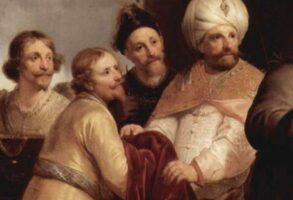Published June 3, 2015
This piece is a response to EPPC Adjunct Fellow Eric Cohen’s Mosaic essay “The Spirit of Jewish Conservatism.”
“Jewish conservatism is meant to create a big-tent community of values and ideas”: it’s a nice image that Eric Cohen uses, but as a people forged amid desert wanderings should know, the soil in which you try to plant the tent poles makes a lot of difference. Here are two nutrients of the soil in which a “big-tent” Jewish conservatism capable of addressing the crisis of the West and the threats to the state of Israel can be planted; happily, both nutrients are quite kosher.
The first nutrient is to remember that the foundational metaphor of freedom in the civilization of the West is not the storming of the Bastille but the exodus from Egypt. That is, our most profound understanding of freedom does not come from either the continental Enlightenment or the French Revolution—and certainly not from the “liberation” movements of the late-20th and early-21st centuries—but from the Bible. Which is in turn to say that freedom in a truly liberating sense of the word always involves God and man, not just humanity alone. Indeed, it involves humanity learning what the people of Israel learned, often the hard way: that the most humane path through history is the path God is taking, and that genuine human liberation means identifying that path and following it.
The second nutrient is the recognition that the moral code given to the people of Israel at Sinai is itself liberating, for it’s a moral code intended to prevent Israel from falling back into the habits of slaves: from getting shackled in self-constructed Egypts.
And that means, among many other things, that a Jewish conservatism that best serves the Jewish people and the civilization of the West is a conservatism that rejects the claims of atheistic humanism and the project of the autonomous, self-constructing self—which are destroying the West from within—and that embraces the God of Abraham, Isaac, and Jacob as the true liberator.
George Weigel is distinguished senior fellow of the Ethics and Public Policy Center in Washington, D.C., where he holds the William E. Simon chair in Catholic studies.




